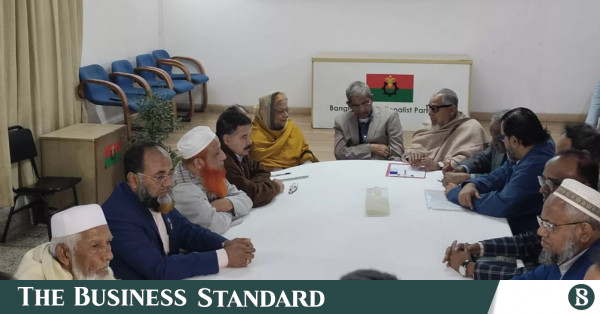Jamaat-e-Islami also echoed the call for elections within 2025
BNP liaison committee members, headed by party Secretary General Mirza Fakhrul Islam Alamgir, participated in the meetings today (21 December). Photo: Collected
“>

BNP liaison committee members, headed by party Secretary General Mirza Fakhrul Islam Alamgir, participated in the meetings today (21 December). Photo: Collected
Leaders of the BNP and like-minded parties have called for the national elections to be held by December 2025, with the party formally initiating discussions with allies in the anti-fascist movement to address the ongoing political situation.
The BNP, during separate meetings with the 12-party alliance, the Jatiyatabadi Samamona Jote, and the Bangladesh Labour Party, emphasised the need for elections to be held by December 2025, opposing the government’s proposed June 2026 timeline.
Bangladesh Jamaat-e-Islami also echoed the call for elections within 2025.
According to BNP’s meeting sources, allies warned that if elections are not held within this period, political instability may worsen, and opposition factions, described as “allies of fallen fascists,” may hatch conspiracies that could harm the country and people.
The discussions, which focused on the current political situation, revealed strong support from the allies for holding elections sooner. The allies reiterated their willingness to cooperate with the interim government to ensure free, fair, and acceptable elections.
The BNP and its allies expressed concerns over recent statements from the chief adviser and his press secretary regarding the election. They criticised the lack of coordination within the interim government, which they believe is causing confusion in both the political arena and among the general public.
On 16 December, Chief Adviser Muhammad Yunus suggested the next general election could be held between the end of 2025 and mid-2026, following necessary state reforms. He also announced the formation of a commission to build a national consensus with political parties.
However, the next day, his press secretary, Shafiqul Alam, indicated that the election could be held by 30 June 2026, which BNP leaders saw as contradictory and unclear.
The meetings were led by BNP Secretary General Mirza Fakhrul Islam Alamgir, with participation from Standing Committee members Nazrul Islam Khan, Selima Rahman, and Vice Chairman Abdul Awal Mintoo.
Mirza Fakhrul raised concerns about persistent domestic and foreign conspiracies aimed at destabilising the country, urging all political parties to adopt a more strategic and moderate approach.
He stressed that political statements must avoid division, and the government should be allowed time to hold elections, but in a logical manner that aligns with the political and economic realities.
Nazrul Islam Khan, after the meeting, noted that discussions had also touched upon political and economic issues, as well as the grievances of the general public.
Mostafa Jamal Haider, chairman of a faction of Jatiya Party (Kazi Zafar), who also heads the 12-party alliance, indicated that no major decisions were being announced at this stage. He stated that decisions would be made after a meeting of the BNP’s standing committee in the coming days.
The meeting also saw participation from top leaders of the Jatiyatabadi Samamona Jote, led by National People Party (NPP) Chairman Fariduzzaman Farhad, and leaders from the Bangladesh Labour Party, led by Mostafizur Rahman Iran.
The BNP is planning a series of additional meetings with other like-minded parties in the coming days to further strategise and consolidate their position on the election issue.
Jamaat’s demand for polls
The next national election must be held by 2025, Nayeb-e-Ameer of Jamaat Syed Abdullah Muhammad Taher said.
“We have demanded a fair, neutral, and participatory election, and it should take place within 2025,” he said at a conference organised by the party at the AJ Model High School field in Cumilla’s Chauddagram today.
The nayeb-e-ameer said the chief adviser earlier mentioned the election could be held if partial reforms are feasible. “But we believe that necessary reforms can be accomplished within three to six months.”
“Therefore, the election process is anticipated to take place by the end of next year, meeting both the nation’s expectations and the party’s demands,” he added.


